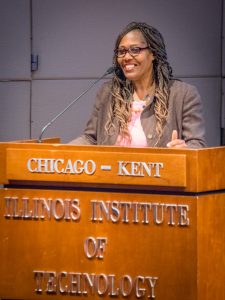
On January 24, 2019, Chicago-Kent hosted the 4th Annual Dr. Martin Luther King Jr. Forum sponsored by the law school’s Office of Diversity, Inclusion, Multiculturalism & Professional Development as well as several faculty committees, departments, and student organizations.
Erika K. Wilson, Thomas Willis Lambeth Distinguished Chair in Public Policy & Associate Professor of Law at the University of North Carolina School of Law, was the featured speaker, presenting a talk titled “Legal Racism: How Inequities Created by the Law Can Be Eliminated by the Law.”
After Professor Wilson’s discussion, other panelists gave their perspectives on the impact of legal racism in finance, education reform, and housing policy. An open question and answer session followed that addressed specific examples, terms, and trends from the presentation and the speaker discussion.
You can find the full videos of the event on our YouTube channel, or view individual videos with the slides and the different speakers and questions in a playlist or our recap below:
“Legal Racism: How Inequities Created by the Law Can Be Eliminated by the Law”
Looking forward to speaking at the 4th annual Dr. Martin Luther King Jr. Forum @ChicagoKentLaw on January 24, 2019. If you’re in the Chicago area would love to see you there. pic.twitter.com/C4ATcrcfqO
— Erika Wilson (@Erika_K_Wilson) January 18, 2019
First Response: Business Perspective
Sidney Dillard, Partner, Head of Corporate Investment Banking Division, Loop Capital
Ms. Dillard started by discussing the impact the Small Business Administration has had and the modifications in the late 70s that created some opportunities through government contracts but have lead to views of diversity in larger corporations that limit their purchases from minority-owned businesses today.
She emphasized the impact of representation in leadership and the different approach her firm takes from other well-known financial institutions.
Second Response: Educational Equity
Candace Moore, Senior Staff Attorney, Chicago Lawyers’ Committee for Civil Rights, focused on two issues: school discipline and school closing.
School Discipline Reform
With the discipline issue, Ms. Moore discussed the dangers of zero-tolerance policies being unevenly enforced due to implicit bias. She pointed to the work of students in Illinois who worked to overhaul disciplinary policies in Chicago Public Schools, then worked to pass statewide legislation towards the same purpose:
What You Missed: 3 takeaways from last week's massive convening on #Illinois school discipline reform more than 1 year after #SB100. cc: @VOYCEProject @LoyolaChicago @teachplus @Ed4Excellence @Governors_State #EducationEquity https://t.co/dp4p2V62XY
— CLC for Civil Rights (@ChgoCivilRights) March 29, 2018
School Closings
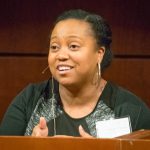 Starting with an overview of the recent history of school closings in Chicago, Ms. Moore talked about the disproportionate impact of those closings on African-American communities. She contrasted that with the story of National Teachers Academy, a high-performing school in the South Loop with 80 percent African-American students, that the district decided to convert into a high school to meet the needs of new residents in the community.
Starting with an overview of the recent history of school closings in Chicago, Ms. Moore talked about the disproportionate impact of those closings on African-American communities. She contrasted that with the story of National Teachers Academy, a high-performing school in the South Loop with 80 percent African-American students, that the district decided to convert into a high school to meet the needs of new residents in the community.
After sharing the role of parents and community organizers in protesting that change, she described the role she played in bringing a lawsuit that claimed several violations of the Illinois School Code and the Illinois Civil Rights Act. Their success in court using a race-based claim was significant in addressing the larger issue of school closings as well as this specific situation.
Third Response: Housing Discrimination
Professor Michael Seng, Director, Fair Housing Legal Support Center & Clinic, The John Marshall Law School, gave an overview of housing laws, current cases, and enforcement policies.
Professor Seng started by saying “If you want to do discrimination law, particularly housing discrimination law, you are in the right place at the right time” because of Chicago’s long history of segregation. He spoke about Dr. Martin Luther King Jr.’s only major northern civil rights campaign—his work in Chicago in 1966.
In covering the legal history of housing discrimination, Professor Seng started with legislation that followed the Civil War, the 14th Amendment, and the role of Jones v. Alfred H. Mayer Co. in 1968, when the Supreme Court pointed to ghettos as a form of slavery. He discussed the delay in enacting the Fair Housing Act in 1968 through cases like Reitman v. Mulkey and the need for amendments in 1974 and 1988 to include gender, people with disabilities, and families with children.
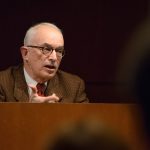 Professor Seng pointed out the unusual legal framing in the Fair Housing Act that says there is “an affirmative duty to further fair housing” and the political necessity of a will to enforce that duty, from George Romney under President Nixon to the later years of the Obama administration.
Professor Seng pointed out the unusual legal framing in the Fair Housing Act that says there is “an affirmative duty to further fair housing” and the political necessity of a will to enforce that duty, from George Romney under President Nixon to the later years of the Obama administration.
With respect to more recent Supreme Court cases, Professor Seng discussed Texas Dept. of Housing and Community Affairs v. Inclusive Communities Project, Inc. and the difficulty in removing entrenched housing discrimination when much older, now illegal, policies continue to impact a specific neighborhood’s population.
Audience Q&A
The panel discussion was followed by an open Q&A with students and others in attendance at the event, and covered specific local policy issues, social and legal factors, and the impact of implicit bias and efforts toward restorative justice in civil rights.
Question 1 – Affordable Housing Policy in Chicago & Cook County
A student asked about the disparity between Cook County’s affordable housing requirements and the complete lack of such housing in specific wealthy neighborhoods: “How does that continue, given that we actually do have laws here in Illinois that say municipalities can’t do that?”
Professor Seng addressed this question looking at the loopholes used by developers and the way this was addressed in Southern Burlington County N.A.A.C.P. v. Mount Laurel Township in New Jersey in 1975 and the ongoing struggle to enforce inclusive zoning and fair housing laws.
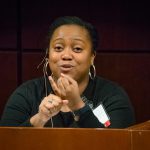 Ms. Moore discussed ongoing local issues in Chicago with affordable housing, from the recent controversy in Jefferson Park and the need to name racialized tensions that can drive political opposition. She pointed to work the Shriver Center is doing to challenge aldermanic privilege that can override housing laws.
Ms. Moore discussed ongoing local issues in Chicago with affordable housing, from the recent controversy in Jefferson Park and the need to name racialized tensions that can drive political opposition. She pointed to work the Shriver Center is doing to challenge aldermanic privilege that can override housing laws.
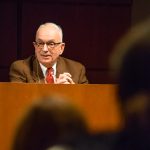 Professor Seng also pointed to the issue of housing voucher discrimination and the strategy of using Cook County’s source-of-income ordinance against discrimination to bring action through John Marshall’s Fair Housing Legal Support Center & Clinic.
Professor Seng also pointed to the issue of housing voucher discrimination and the strategy of using Cook County’s source-of-income ordinance against discrimination to bring action through John Marshall’s Fair Housing Legal Support Center & Clinic.
Question 2 – Moving from Segregation to Integration
From the attendee: “How do we go from segregation to integration when it’s a cultural mindset that’s been entrenched? There are laws, but when people start moving together, how does that happen?”
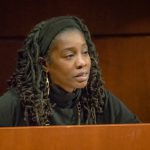 Professor Wilson responded by pointing to laws that can be used to facilitate segregation and to reforms that can correct that impact, such as making sure school attendance is tied to county rather than municipality or city.
Professor Wilson responded by pointing to laws that can be used to facilitate segregation and to reforms that can correct that impact, such as making sure school attendance is tied to county rather than municipality or city.
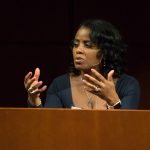 Ms. Dillard noted that data about the neighborhoods where middle class black families lived was reflected in the impact she discussed with school segregation.
Ms. Dillard noted that data about the neighborhoods where middle class black families lived was reflected in the impact she discussed with school segregation.
Ms. Moore pointed to the stereotypes that white families often have about the quality of public education and described a partnership between two local schools, Jenner and Ogden, where parents came together and were able to craft a solution that would benefit all the students.

She noted that they had a narrative of integration with National Teachers Academy, but it didn’t look at the whole community. She also pointed to the need for reinvestment, of seeing a path to investment for all students, not just in specific schools.
Professor Seng noted that while it may seem like we haven’t made progress on a macro level with issues like segregation and fair housing, laws have given people more rights and lead to big differences for individual people. Ms. Dillard agreed, pointing to the impact of civil rights laws that provided more employment opportunities and the way that has impacted small businesses and the rest of the community.
Question 3 – Critical Questions for Equity
A student asked about the school integration examples, about the topics that hadn’t been articulated before but were key to the discussions moving forward and were “critical to the breaking point where it was an equitable engagement.”
Ms. Moore said the narratives she heard at community hearings often started with a lot of rhetoric around danger, low performing schools, and few choices. But she said it was important to look at the ways schools got to that point, as communities changed and resources changed.
When parents had a chance to talk to each other about their personal experiences and to brainstorm about possible resources, they were able to get to better policy discussions.
All parents want the best-quality education they can get for their kids, but many times the district was pushing the process to move as quickly as possible, and it wasn’t paying attention to what the community was saying. Giving people fewer options leads to more divisions and doesn’t allow the full range of possibilities to flourish.
Question 4 – Defining Antisubordination
“I had not heard of antisubordination until tonight. Could someone explain that?”
Professor Wilson described the background of this term and pointed to the difference between anti-subordination and anti-discrimination. She noted that making distinctions, pointing to differences, can make people uncomfortable, but it’s needed to undo some marginalization.
Question 5 – Downward Mobility Factors
An attendee asked about the slide that showed how some black parents who went to college had children who didn’t continue on that upward trajectory. “You didn’t talk about the factors. What kind of factors went into that?”
Professor Wilson pointed to factors of access to education, residential segregation, employment discrimination, and access to social capital as ongoing issues, bringing in a few examples from her own life.
Question 6 – Negative Stereotypes & Implicit Bias
A student asked about problems she’s seen that she connected to the discussion of downward mobility and social capital, negative stereotypes and correcting prejudice.
Professor Wilson talked about the problem that segregation brings less cross-racial contact that breaks down stereotypes and the impact of media bias.
Ms. Moore agreed and pointed to implicit bias encouraged by caustic images in the media that impact how people perceive their day-to-day experiences. She suggested looking for more literature and movies to offer different perspectives. Implicit bias has an impact on hiring in the workplace too, she noted.
Professor Seng offered examples from the restorative justice program at John Marshall and the value of exposure—of having law students and high school students learn more about different neighborhoods through the program as well as the value of restorative justice in bringing communities together to be heard and to craft solutions that work for everyone, as in Ms. Moore’s examples.
Event Photos:

Thanks to all of the sponsors of this event: Office of Diversity, Inclusion, Multiculturalism & Professional Development, Office of Continuing Legal Education, Office of Institutional Advancement, Office of the Dean, Faculty Diversity Committee, Student Bar Association, Black Law Students Association, Asian Pacific Law Students Association, Hispanic Latino Law Students Association, and the Chicago-Kent Lambdas.

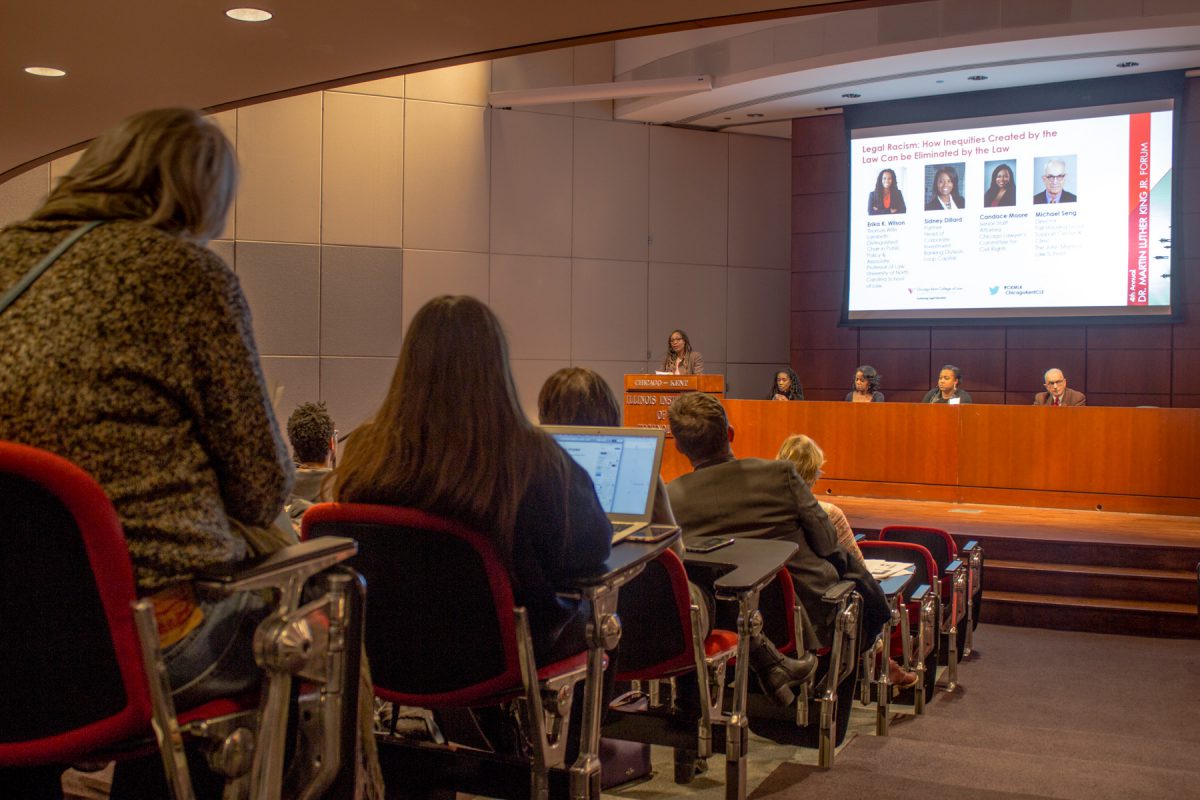

















Thank you I never got bored while reading and I read it with excitement 🙂